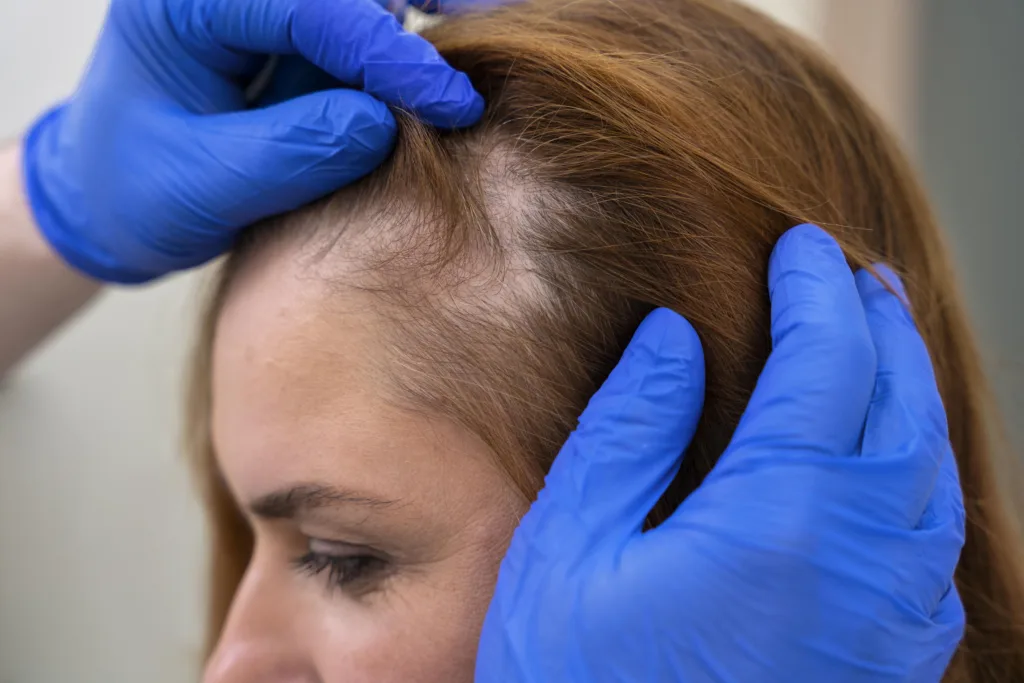Table of Contents
ToggleDoes Stress Cause Hair Loss?
Stress is a common part of modern life, affecting our physical and mental health in many ways. One of the most worrying effects of long-term stress is hair loss, which can increase stress and create a difficult cycle.
Understanding the link between stress and hair loss is crucial for managing both. This article explores the science behind stress-induced hair loss, the types of hair loss connected to stress, symptoms to look out for, and ways to reduce its effects.
The Science Behind Stress and Hair Loss:
To understand how stress leads to hair loss, it’s important to know about the hair growth cycle. Hair grows in three stages: the anagen (growth phase), catagen (transitional phase), and telogen (resting phase).
Normally, about 85-90% of the hair on your scalp is in the anagen phase, actively growing, while the remaining 10-15% is in the catagen or telogen phase.
Stress mainly affects the shift between these stages, especially by pushing hair follicles from the anagen phase into the telogen phase too early. This condition, known as telogen effluvium, causes increased shedding and noticeable thinning of hair.
Types of Hair Loss Linked to Stress:
There are three type of hair loss linked to stress:
- Telogen Effluvium: The most common form of stress-induced hair loss, telogen effluvium, occurs when a remarkable number of hair follicles enter the resting phase prematurely. This results in diffuse thinning across the scalp, noticeable when hair falls out more than usual, such as when washing or brushing.
- Alopecia Areata: This autoimmune condition can be triggered by severe stress. The body’s immune system mistakenly attacks hair follicles, leading to patchy hair loss. The exact cause is unknown, but stress is a well-documented trigger.
- Trichotillomania: This psychological condition involves the compulsive urge to pull out one’s own hair in response to stress or anxiety. This behavior can lead to noticeable bald patches and further psychological distress.
Symptoms and Signs of Stress-Related Hair Loss:

Recognizing the symptoms of stress-related hair loss is crucial for early intervention. Some common signs include:
- Increased Hair Shedding: Noticing more hair on your pillow, in the shower drain, or on your hairbrush can be an early indicator.
- Diffuse Thinning: Unlike localized bald patches, stress-related hair loss often presents as a general thinning across the scalp.
- Hair Texture Changes: Stress can also affect the quality of your hair, making it dry, brittle, and more prone to breakage.
Biological Mechanisms:
Stress causes a series of hormonal changes, responses in the body, particularly the release of cortisol, known as the stress hormone.
Elevated cortisol levels can disrupt the normal functioning of hair follicles, pushing them into the telogen phase prematurely. Additionally, stress can lead to inflammation, which can damage hair follicles and further delay hair growth.
Common Myths and Facts:
There are several myths and misconceptions surrounding stress and hair loss. Here are common ones:
- Myth: Stress causes immediate hair loss. Fact: Hair loss from stress usually occurs several weeks to months after a stressful event.
- Myth: All hair loss is permanent. Fact: Hair loss due to stress is often temporary, and normal hair growth typically resumes once the stress is managed.
Stress Management Techniques:

Managing stress is crucial for preventing and reduce hair loss. Here are some effective strategies:
- Mindfulness and Meditation: Practices such as mindfulness and meditation can significantly reduce stress levels, promoting a sense of calm and relaxation.
- Exercise: Regular physical activity is a natural stress reliever. Exercise helps lower cortisol levels and releases endorphins, which improve mood and reduce stress.
- Adequate Sleep: Quality sleep is vital for managing stress. Ensure you get 7-9 hours of restful sleep per night to support overall health and reduce stress.
The Role of Nutrition:
A balanced diet rich in essential vitamins and minerals is crucial for healthy hair growth. Nutrients such as biotin, vitamin E, zinc, and iron play a significant role in maintaining hair health.
Stress can decrease these vital nutrients, so it’s important to maintain a nutritious diet during stressful times.
When to Seek Professional Help:

If you notice persistent or severe hair loss, it’s essential to consult a healthcare provider. They can rule out other underlying conditions and provide appropriate treatments.
Dermatologists and trichologists specialize in hair and scalp health and can offer targeted therapies to address stress-related hair loss.
Psychological Impacts of Hair Loss:
Hair loss itself can be a significant source of stress, creating a difficult cycle. The psychological impact of losing hair can lead to anxiety, depression, and a decrease in self-esteem. Addressing the emotional aspects through counselling or support groups can be beneficial. Understanding that stress-induced hair loss is usually temporary can also provide reassurance and reduce anxiety.
Latest Research and Developments:
Recent studies have explored the role of stress hormones and their impact on hair follicles. Advances in understanding the biological mechanisms of stress-induced hair loss have led to new treatments aimed at reduce its effects. Researchers are also investigating the role of inflammation and the immune system in stress-related hair conditions, potentially cover the way for innovative therapies.
Effective Treatments and Therapies:
- Topical Treatments: Products containing minoxidil can stimulate hair growth and are often recommended for stress-related hair loss.
- Oral Medications: In some cases, doctors may prescribe medications to reduce hair loss and promote regrowth.
- Therapies: Techniques such as laser therapy and PRP (platelet-rich plasma) injections have shown promise in promoting hair regrowth and improving scalp health.
Lifestyle Changes to Reduce Stress and Promote Healthy Hair Growth:
Incorporating stress-reducing practices into your daily routine can have a significant impact on hair health. Consider these lifestyle changes:
- Regular Exercise: Engage in regular physical activity, such as yoga, jogging, or swimming, to help lower stress levels and promote overall well-being.
- Balanced Diet: Ensure your diet is rich in essential nutrients that support hair health, including vitamins, minerals, and proteins.
- Hydration: Ensure you drink enough water to keep your body and hair properly hydrated.
- Relaxation Techniques: Practice relaxation techniques such as deep breathing exercises, meditation, and progressive muscle relaxation to manage stress.
- Healthy Sleep Habits: Establish a regular sleep routine and create a restful environment to ensure you get enough sleep.
Related Links:
Conclusion:
Stress is a common trigger for hair loss, but understanding its mechanisms and implementing effective management strategies can help reduce its impact. By taking proactive steps to manage stress, such as practicing mindfulness, maintaining a balanced diet, and seeking professional help, when necessary, you can support your overall health and maintain a healthy head of hair. Remember, stress-induced hair loss is often temporary, and with the right approach, you can break the cycle and promote healthy hair growth.
Frequently Asked Question’s:
Q. Can stress cause immediate hair loss?
A: No, stress-induced hair loss, such as telogen effluvium, typically occurs several weeks to months after a stressful event. The hair follicles prematurely enter the resting phase, leading to noticeable shedding later.
Q. Is hair loss due to stress permanent?
A: Hair loss caused by stress is usually temporary. Once the stress is managed and the hair growth cycle returns to normal, hair typically grows back over time.
Q. What are some effective ways to manage stress and prevent hair loss?
A: Effective stress management techniques include mindfulness and meditation, regular exercise, adequate sleep, and maintaining a balanced diet rich in essential vitamins and minerals. These practices can help reduce stress levels and support healthy hair growth.
Q. When should I seek professional help for my hair loss?
A: If you experience persistent or severe hair loss, it is important to consult a healthcare provider. They can rule out other underlying conditions and provide appropriate treatments.
